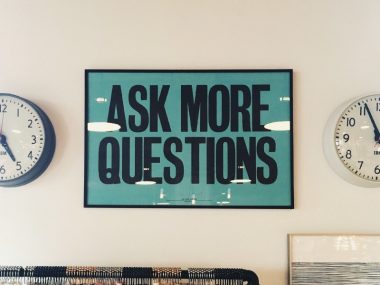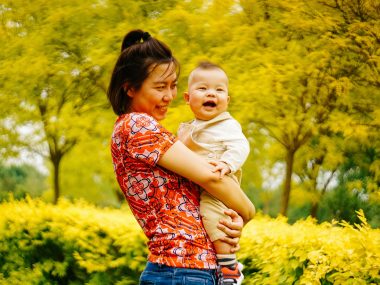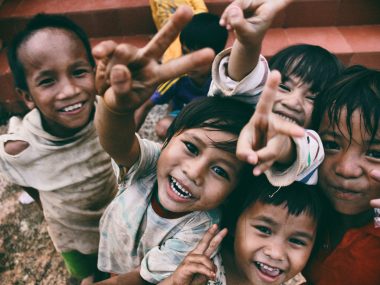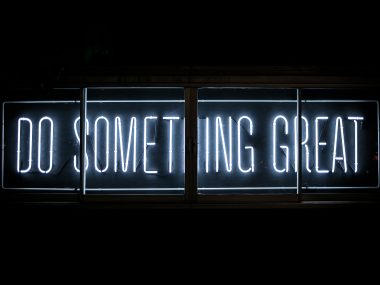What kind of difference are you going to make today?
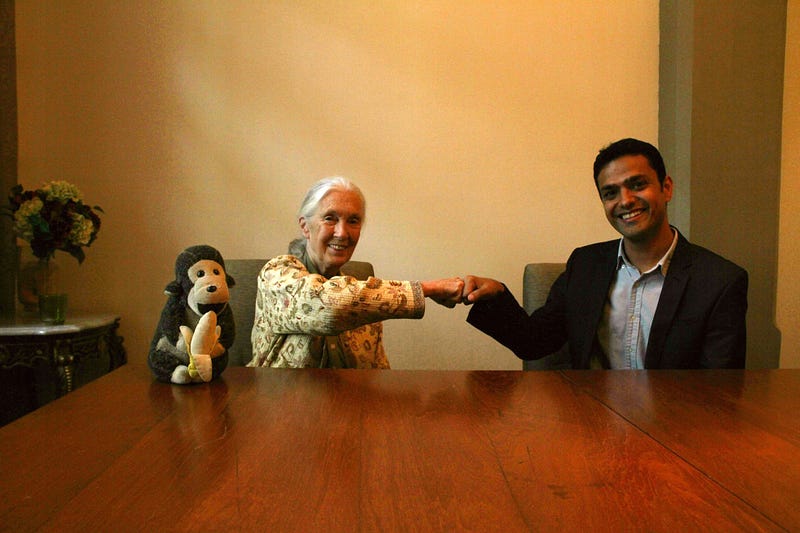
During her Singapore visit, GIVE.asia’s co-founder Aseem had a chance to meet with the renowned primatologist, ethologist, anthropologist and UN Messenger of Peace Dr Jane Goodall. Here’s a write up of the chat…
We’re fascinated by the work you’ve done and really inspired by it. Thank you so much for making the time. I know you have such a busy schedule.
It’s everybody. We’re all always busy. (smiles)
If you were to think back to your childhood, when was the first time you recollect of observing animals?
Jane: Well, I started observing animals when I was one and a half, with earthworms. Then I went on my first real proper observation of animal behavior which was waiting four hours at the hen house to see how a hen laid an egg. And the main point of that is that I had a supportive mother who wouldn’t get mad when I did, what other mothers would think was naughty… putting earth in your bed, disappearing and causing everybody panic as they didn’t know where I was.
Do you remember the first time you did something to protect animals or protect the environment?
I always used to pick up worms and move them off the road. Always did that… And rescued any little insects that were drowning and dried them up.
At what point did you decide to devote your life to environmental conservation and what made you do that?
That was 1986 and I had been with the chimpanzees since 1960s. We had a conference and it was bringing 7 different chimpanzee sites across Africa together, which had never happened before. We had one session on conservation and it was a total shock because in each of these 7 places, forests were disappearing, chimp numbers were dropping. Foreign companies moving in, logging and mining. We saw the beginning of the bush meat trade, commercial hunting and we also had a session on conditions in medical research labs which was utterly shocking. I couldn’t believe it. Our closest relatives in 5 foot by 5 foot cages. Just because their bodies are like ours.
You’ve travelled a lot across the world. You’ve seen students do a lot of creative projects on the environment. Do you have any top examples, or your favorite examples, of inspirational projects?
So many. We’re in more than a hundred countries. We’ve got over a hundred thousand active groups. One of our projects I think is very symbolic, because our roots and shoots program is about making the world better for people, the animals and the environment. But it’s also about breaking down the walls we build between people of different nations, different cultures, different religions, as well as between us and the natural world.
This is a project that was done in the Democratic Republic of Congo in the East where there is still periodic fighting. It’s rich in minerals so all the big companies come in, but also different militia come in and try to take control of the area. And as the first little Roots and Shoots program formed there… about 15 children (between the age of 9 and 12) decided that for their first project, they wanted to plant trees on this hill, which had been a sacred hill they had found covered in forest. Their coordinator, a Congolese, had to go to the resident militia for permission. And the Colonel said, “Well, it seems like a very foolish project but it seems there’s no harm in it but I will have to send some soldiers with you.”
So you imagine these 13 kids, with their little saplings, and their coordinator, going off to this hill which is much further away and it’s very hot. And they’re traveling with 4 soldiers with AK-47s. They get there and the soldiers are standing. After about half an hour, it’s very hot and one little girl starts to cry, she’s the youngest. The ground is so hot and she can’t dig up a hole properly. And then in about 15 minutes, one soldier has put down his gun, leaned it on the tree and he’s helping her. Within the next 20 minutes, all the soldiers have left their guns and are helping the children plant trees. And I feel that was very symbolic.
Aseem: People helping people.
Jane: People helping people but also the environment by reforestation. Because one of the problems is the destruction of the forest and the pollution of the ocean and the plastic bags. We have many tree planting programs all around the world. And we have children do beach clean-ups, collecting plastic. But of course, you collect the plastic and it’s back the next day. It’s a huge problem but they’re tackling it.
What is your advice to students who are thinking about which problems to tackle because there are so many?
Well we try not to advise them. Well, not with the little ones. We start with kindergartens and obviously they need some guidance. If it’s high school students, each group chooses 3 projects to make the world better — 1 for animals, 1 for people, 1 for the environment. They don’t all have to do all the project. They do the projects they are passionate about it, so they chose it and we didn’t tell them to do it. So it’s bottom-up, and this means they get much more involved in their idea. And we have individuals acting on their own.
So the Jane Goodall Institute has been around for 40 years and it’s an amazing accomplishment. What would you like the Jane Goodall Institute (JGI) to achieve in the next 40 years?
Jane: When I’m long gone… (chuckles) Well, I hope it would have grown, but it’s hard to say when the world’s such a mess right now. It’s hard to think in a positive way about what we might be doing. Certainly, I hope we will have many more roots and shoots groups. We’ve got 33 JGIs, but then we’ve got 100 countries with Roots and Shoots. The JGI is the umbrella, and Roots and Shoots is our environmental education program. And we also raise awareness about environmental concerns and raise money specially for apes but also for Roots and Shoots.
Would you consider yourself more as a believer of grassroots and bottoms-up approach, compared to a top-down approach?
Yes, because with top-down approach you can make laws but if people don’t obey them then laws don’t mean much. So now we’ve got people around the Gombe involved in conservation. They get the point. They want to conserve it, whereas if the government tells them they got to do things, they immediately don’t want to do it.
Why do you think the Jane Goodall Institute for Singapore is important for the overall initiative given Singapore is such a small nation?
Jane: Basically, because Singapore is such a small space, to create a situation where people and animals and nature lives in harmony, it’s very difficult. So we need young people here to think positively. And JGIS and our Roots and Shoots program contribute to that.
What is your hope for the future?
Jane: If you want my dream vision for the future, it’s having Roots and Shoots program in all the schools and universities around the world. It’s having an endowment for our major projects. If there’s trouble in Africa, we should have sanctuaries for all the chimps. If there’s trouble in Africa, people may not want to donate money, they might think it’s a waste. Meanwhile, we have to pay the staff and for the chimps’ food, and we also need to keep the Roots and Shoots program alive. So raising money for an endowment and we now it’s set up and is legal and has a bank account and everything, to raise funds for the endowment which can ensure the continuation of my work when I’m gone. So then I will be free to die if I want to (chuckles).
And is it also for people to adopt a chimpanzee…
Jane: …To become a chimp guardian, yes.
And would you know a chimp guardian?
Jane: I’m sort of leaving them to it on the ground, but we can let you know.
Great, I think a lot of people would be very interested.
Jane: At the moment a lot of people are adopting chimps from the biggest sanctuary Tchimpounga, but we also have a sanctuary in South Africa Chimp Eden, and then there’s Gombe. So the plan is to adopt chimps from all those places.
How much does it cost?
Jane: I cannot keep all this data in my head..I am not that involved in that project. It’s not that expensive.
Also I’m curious about if you have any thoughts on how charities, non-profits and NGOs can do a better job at being transparent. Do you have any thoughts on that?
Jane: Well, since we’ve been through periods when we weren’t as transparent as we should have been, I know how important it is. We’re very transparent now. The biggest JGI, the American one, is where most of the money in Africa comes from. But all the other JGIs are picking up. And transparency these days is increasingly important because the public’s becoming more sophisticated. They’re asking the right questions.
How much impact does it make to be a vegetarian?
When many people become vegetarian, it makes a huge difference. For animal welfare, of course it does, when you think about the factory farms. But also, to feed the billions of animals that are being slaughtered for meat. They need to be fed. So environments are destroyed to grow the grain. Huge areas, literally, just to grow grain, using mostly agricultural pesticides and herbicides. Lots of fossil fuel to get the grain to the animals, the animals to the abattoir, the meat to the table, and huge waste of water changing vegetable to animal protein.
With regards to the program that started running in Jane Goodall Institute Singapore which started studying langurs and macaques, how different are they from the programs you were involved in?
Gombe is still our research station and besides chimpanzees, we also study baboons and monkeys. So the studies of the macaques are done in a similar way everywhere. The problem of the conflict between people and animals, we have those in other places too. The hope is to bring people who are involved in this kind of problem-solving space together, maybe here in Singapore, to share successes and failures, and try and come up with good ideas. So I want to see a competition for a monkey-proof litterbin and I want to see tough fines for people who are seen feeding monkeys because there have been conflicts over food and people are feeding them.
Can you share more about the context behind this?
The context is that some people are living very close to a national park. People go into the national park and they meet a the monkeys, and they think they would like some bananas, and give it to them. The monkeys then become fond of bananas. They see tourists who are not planning to feed them but have some bananas, so they’ll raid them and somebody might get hurt. And gradually, they’ll move out to the houses and start searching for bananas. If they manage to be successful, they’ll start getting too much easy food, eating less of their own food, which means their weight goes up and they’ll probably have more babies. So then you are artifically inflating their population while their own environment is getting less because of development. So you’ve got a crazy situation.
One of the key ways we can try and address this is to really impose fines on people. And that’s why I want to see a competition for a monkey-proof litterbin. I’ve been in a national park and observed a group of schoolchildren. And they’d been very good, they had their lunch and put their waste in the litterbin, and the monkeys were just sitting and waiting. As soon as the children were gone, they went and took the food out and ate it. [People have tried to create] a monkey-proof litterbin, but we haven’t got a successful one yet.
Okay, that would be quite an interesting challenge.
Yeah, a nation-wide competition.
Even a global competition to see which country comes up with the best.
Well, let’s just start here.
Start small. Another question here: Hypothetically, if you had a time machine, and you could take yourself back to a point when you were younger and offer yourself a piece of advice in a minute, what would you say?
I would say what my mother said to me when I wanted to go to Africa, which was “you have to work hard, take advantage of opportunity and never give up,” and I can’t think of any better advice to give myself than what my mother gave me.
That’s a great piece of advice.
I take it all round the world. The number of adults who’ve come up to me and said “I really want to thank you because you taught me, because you did it, I can do it too.”
Any last words to end this with?
Jane: I think a lot of people are very aware of the problems on the planet but they feel helpless. You know… what can I do. But the main message of Roots & Shoots program is that every individual makes a difference everyday and we have a choice as to what kind of difference we are going to make. And if we make small, even small ethical choices in what we buy, where did it come from, how was it made, was the making harming the environment, cruelty to animals, child slave labour, what do we eat, what can vegetarianism do. And if I just do it, it doesn’t make any difference but if a thousand and then a million and a billion people all start making ethical choices each day — then you begin to see real change.
To support Jane Goodall Institute’s work, please consider making a donation at https://janegoodall.give.asia/


